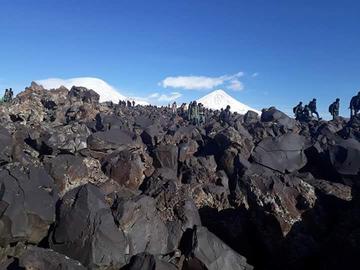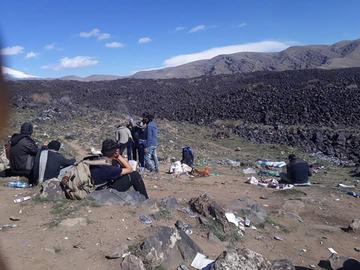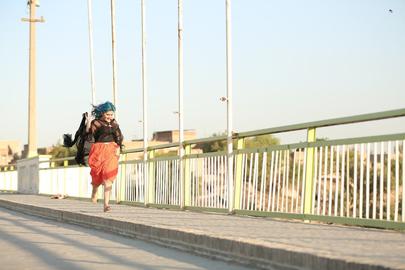"I was the only Syrian out of 100 immigrants from four nationalities staying in three rooms in a house on the Turkish-Iranian border,” a man going by the name Aboud told IranWire. “All of us were waiting to enter Turkish territory for our onward journeys."
Aboud, who uses an abbreviation of his full name because he does not want to reveal it out of concern for his family still in Syria, is in his late twenties and was born in the city of Damascus. He studied commerce at a public university in the capital, but his graduation was put on hold because the time had come for him to complete his compulsory military service. He spoke to IranWire about his illegal journey from Iran to Turkey and the reasons he chose this path. He told me there were three ways to cross the border: via a mountain cliff road, jumping from the border wall, or going through sewage pipes.
"I do not want to take up arms to kill my fellow citizens, I am not one who serves the interests of other people by force, and I do not want to carry the lives of other people on my shoulders," he told me, confirming that he left Syria to travel to Iran in 2018, going via Rafic Hariri Airport in Beirut to escape military service.
"My options to go to other countries were very limited. Since 2017, all of my attempts to obtain a scholarship or secure a job contract in another country have failed, but I was finally presented with the choice of either staying in Lebanon or going to Iran with the possibility of completing my journey onwards to Europe via Turkey, so I chose Tehran as my destination."
From Syria to Turkey via Iran
Syrian citizens are allowed to stay in Iran for three months, which can be extended for a further one month, after which some try to stay illegally. If arrested by the Iranian authorities, they face immediate deportation back to their country.
Aboud stayed in the capital Tehran for four months. It was winter, so it was difficult to cross land borders on foot, especially illegally. He waited for the weather to improve before beginning his journey. After much searching, Aboud met another Syrian through Facebook who had reached Greece from Tehran via an Iranian trafficker. He contacted him immediately, and told IranWire he had tried to cross into Greece unsuccessfully several times.
Aboud traveled from Tehran to the city of Urmia in northwestern Iran, where he met with the trafficker, who reassured him that the road to Turkey would only take a few hours, and accordingly, an amount of $1,300 was agreed upon to transport him from the Iranian-Turkish border to Istanbul in the north, including one meal per day. Despite this, the journey to the city of Van in eastern Turkey on the Iranian-Turkish border took eight days. Aboud said it took two whole days on the border. "It was a bumpy mountain road that was difficult for even animals to pass,” he said. “I suffered more than I have ever suffered before."
Aboud confirmed that during their trip across the mountains, they met members of the Kurdistan Workers’ Party (the PKK), who searched everyone and allowed them to cross after the trafficker bribed them with a few hundred dollars. After crossing the river separating Iran and Turkey and officially entering into the Republic of Turkey, they were brought to a house in a semi-remote village in Van province, where about 100 immigrants from Iran, Pakistan, Afghanistan, and Kashmir were staying. He was the only Syrian. The majority were Iranian.
Aboud explained that all the immigrants' final destination was Europe, except for one young Iranian woman who wanted to settle in Istanbul. She had run away from her family by herself in fear of the "social customs in her country," stressing that she had been planning to settle in Turkey for a long time, had learned Turkish and spoke it fluently.
Family Seeks Reunification by "Illegal" Means
IranWire also met a 17-year-old Syrian girl going by the pseudonym Farah. She was from the city of Al-Salamiyah in Hama in northwest Syria. She had been living with her family in Malaysia, and her mother's residency permit had not been renewed, and so they chose Iran in order to illegally migrate to Europe. The family later planned to seek asylum.
Within 12 hours of Farah's arrival in Tehran in 2019, she was transferred to the Iranian-Turkish border, and crossed the border within seven and a half hours. She spent one full hour crossing a very dangerous sloping cliff face. "There was no room for error, death was the fate of anyone who fell from the cliff," she said of her journey across the border, which she made alongside 34 Afghans. There were also 12 children in their group. The group all moved on to Istanbul within two hours of entering Turkey.
Farah told IranWire that her mother took a different route, jumping from the border wall separating Iran and Turkey (which stands three meters tall) after a six-hour walk. She said her relatives crossed the border by crawling for five hours through sewage pipes measuring one and a half meters high.
Silent Smuggling Journey
Ali al-Aseel, a young Syrian man from the city of Qamishli who currently resides in the Netherlands, told IranWire that his journey from Iran to Europe lasted four months.
Ali's journey started at Khomeini Airport in the Iranian capital, Tehran, on March 8, 2018 and ended in the Turkish city of Istanbul, where he arrived on March 15. He crossed the border on foot over a period of 17 hours.”Those hours were horrific, I will never forget them," he said. He told me he paid a trafficker about $950 to cross the border.
He confirmed that he and a young man from the city of Idlib were the only two Arabs on the journey. They traveled along with 211 adults from Afghanistan, Pakistan, Bangladesh, and Iran. He said he could not count the children "because there were so many."
He explained that when they arrived at the border, the trafficker told them not to make a sound, because if they were caught by either side (Iranian or Turkish), they would immediately be returned to their country, which no one wanted.
He added that the traffickers attacked anyone who made a sound, using anything they had at their disposal, such as stones or wood strewn on the ground. They didn’t distinguish between women or men, young people or old.
But he also described how it was almost impossible to remain completely silent. They were crossing a steep, sloping mountain, and there were many children with them. It was dark, making it easy for family members to become separated from one another. Everyone was exhausted by the many hours of walking in the cold.
Ali said the traffickers swapped from one region to another, and it seemed that with every change-over, the items they used to beat the migrants got more sophisticated. At one point a group of traffickers riding horses charged at anyone who made a sound, hitting them with whips.
He said one time he arrived at the place traffickers had brought people from the Turkish side of the border to shelter before continuing on their journey. Only four people out of 211 had made it, and they were soon put in a room no bigger than 6x2 meters with 122 other people.
When Ali talked to IranWire about the journey, he described it as being devoid of all humanity, the traffickers saw everyone as means of making money, and that they would beat them and threaten their lives to make this possible. Ali said he paid a trafficker $10 not to beat him.
The Smuggling Season
Aboud and Farah both told IranWire that they had waited for winter to end before embarking on their journeys, as the traffickers had instructed. Illegal crossings tended to begin in the spring and summer, they said, due to mountainous areas being extremely cold and covered in snow, which prevented any movement, especially since many of the migrants were families with children.
However, in complete contrast to this, Ali made it clear that he crossed the Iran-Turkey border in March, confirming that journeys do continue throughout the year and are not always prevented by snow or heat.
Official Numbers
According to the Turkish Ministry of Interior's official website, 2019 saw the largest number of illegal migrants arriving in Turkey over the last 15 years, amounting to 454,662 people caught by the authorities in the provinces of Van, Ağrı, and Erzurum in the east of the country, and in Muğla, Aydın, Izmir, Çanakkale, Edirne, and Istanbul in the west.
Turkish officials said that last year, Afghan migrants came top of the list of nationalities arrested entering the country illegally, numbering 201,437, followed by Pakistanis at 71,645, Syrians at 55,236, and Palestinians at 12,210. In fifth place were Iraqis, at 12,097, and in sixth place Iranians, at 8,753, followed by Georgians, Myanmarese, and Moldovans.
As for the current year, January saw 20,933 illegal immigrants entering Turkey, and 18,546 in February, with a total number of 655,918 immigrants arriving from various nationalities.
In a previous report, IranWire talked to a young Iranian man about his six-month journey overland with his family from Iran to Switzerland. He sid that the main factors driving people to migrate included economic reasons, people's lives being threatened by governments, or a need to secure personal freedoms.
visit the accountability section
In this section of Iran Wire, you can contact the officials and launch your campaign for various problems



























comments